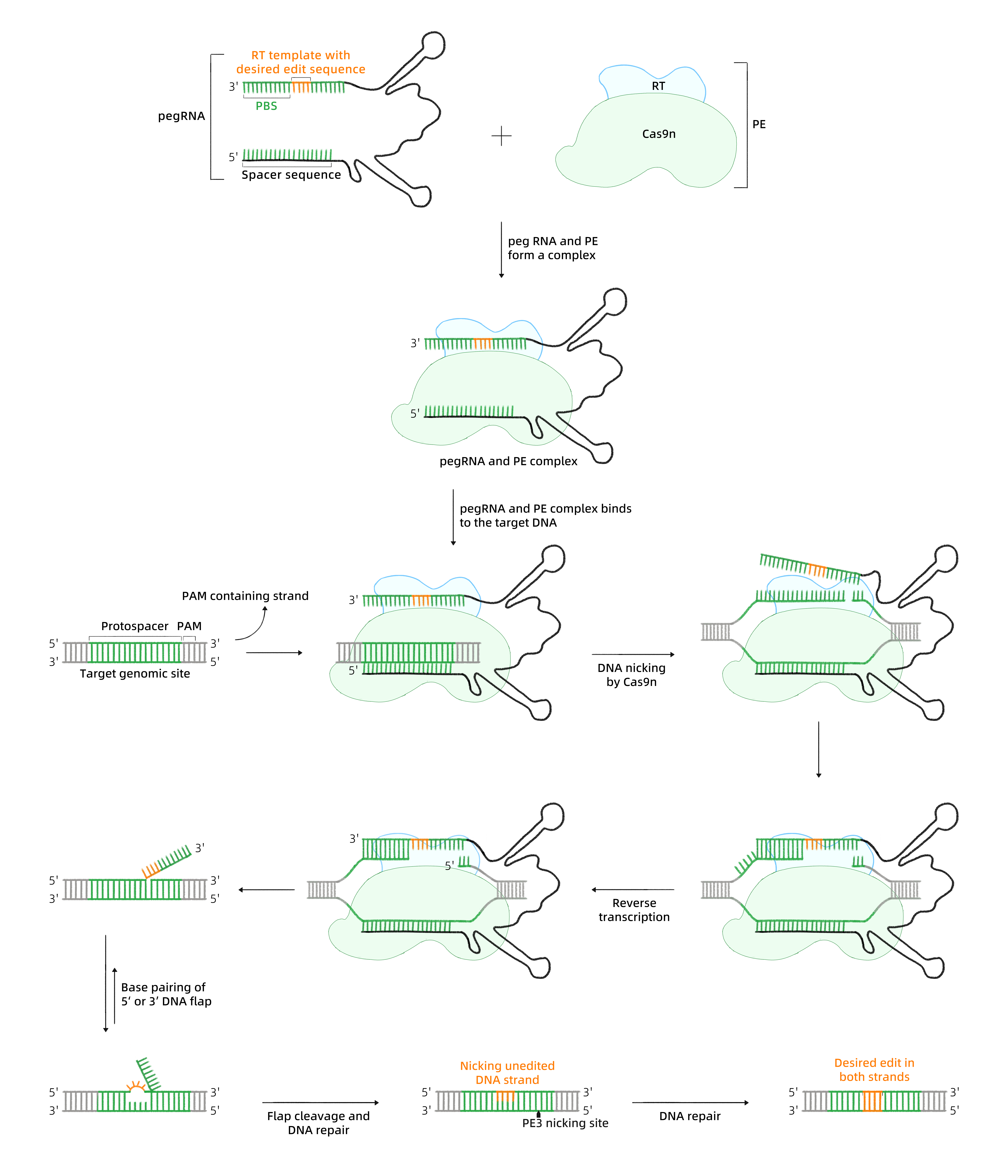Bingo™ Prime Editing Platform
EDITGENE has established a mature gene point mutation editing platform, Bingo™ PE7, which is based on the latest Prime Editing editing strategy (PE7). This platform has advanced and mature scheme design and experimental system, which can efficiently and accurately obtain the cell models with random base transition, small fragment knockout or insertion. To resolve the problems in your experimental process, such as inaccurate editing, low editing efficiency, low transfection efficiency, and low efficiency in obtaining homozygotes, to accelerate your research progress.
Empower your experiments with Bingo™ PE7 — our expert-designed service platform delivers the precision and reliability your research demands.
Click to View Our Point Mutation Cell Line Customization Services
Technical Principles of Prime Editing
Bingo™ Service Advantages
Efficient editing system
Efficient pegRNA design algorithm system
Enhanced Cas9n-RT editing enzyme system
Efficient transfection system
Efficient single clone sorting technology
Technical support provided by experienced experts
Related technical services and products
Highlights of Bingo™ PE7 Technology
Bingo ™ PE5 is iteratively upgraded by EDITGENE and Bingo ™ PE7 is officially launched with higher editing efficiency.
1) Compared to Bingo ™ PE5, the success rate increased by 4.71 times /span>
Improvement in editing efficiency of PE7 compared to PE5
| Targeting site | PE5 editing efficiency | PE7 editing efficiency | The fold increase in editing efficiency of PE7 compared to PE5 |
|---|---|---|---|
| LPIN1 | 2.67 | ||
| JMID7 | 4.71 | ||
| SEC23B | 3.83 | ||
| TMEM41A | 2.87 | ||
| ACE site 1 | 2.54 | ||
| PPPIR12B site 1 | 2.85 | ||
| PPP1R12B site 2 | 1.76 | ||
| TFE3 | 2.71 | ||
| NOS3 | 1.59 | ||
| TAF6L | 1.41 | ||
| CERS2 | 1.36 | ||
| IL4R site 1 | 1.36 | ||
| TRIM41 | 1.23 | ||
| ODC1 | 1. 39 | ||
| KCNI12 site 2 | 1. 23 | ||
| KCNJ12 site 1 | 1. 21 | ||
| IL4R site 2 | 1.13 |
Note: 1 grade<10%, 2 grade20%-30%, 3 grade30%-40%,4 grade50%-60%,5 grade 70%
2) Implementing the effective editing at challenging sites
The editing efficiency of Bingo ™ PE7 is very efficient, which makes it possible to edit challenging sites. We tested multiple difficult sites by using PE7 and PE5 systems, and the results showed that Bingo ™ PE7 can effectively edit these sites. This means that tasks that were previously difficult to edit have become feasible, creating the possibilities for breakthrough research.
Sites where editing failed via PE5, but were successfully edited via PE7
| Targeting site | PE5 editing efficiency | PE7 editing efficiency |
|---|---|---|
| MMACHC targeting site 1 | ||
| MMACHC targeting site 2 | ||
| ACE targeting site 2 | ||
| ACE targeting site 3 |
Note: 1 grade<10%, 2 grade20%-30%, 3 grade30%-40%,4 grade50%-60%,5 grade 70%-100%





